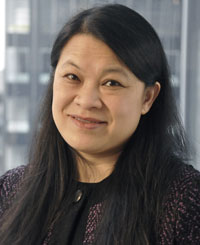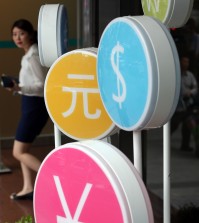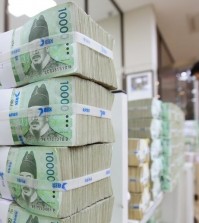- California Assembly OKs highest minimum wage in nation
- S. Korea unveils first graphic cigarette warnings
- US joins with South Korea, Japan in bid to deter North Korea
- LPGA golfer Chun In-gee finally back in action
- S. Korea won’t be top seed in final World Cup qualification round
- US men’s soccer misses 2nd straight Olympics
- US back on track in qualifying with 4-0 win over Guatemala
- High-intensity workout injuries spawn cottage industry
- CDC expands range of Zika mosquitoes into parts of Northeast
- Who knew? ‘The Walking Dead’ is helping families connect
‘Korean economy bottoms out’
JP Morgan’s forecast backs finance minister’s upbeat outlook
By Yi Whan-woo
The Korean economy will be on a stable course toward recovery next year, according to Joyce Chang, a senior researcher at J.P. Morgan.
Chang also predicted that Bank of Korea rate hikes are still “far away” because inflationary pressure still remains weak.
“My macro view is very constructive on Korea. We think that the economy has bottomed,” said Chang, the firm’s managing director and global head of fixed income research, during an interview with The Korea Times Wednesday.
The researcher forecast that Asia’s fourth-largest economy will grow 3.8 percent in 2014 and 3.9 percent in 2015. That outlook echoes previous projections made by Deputy Prime Minister and Minister of Strategy and Finance Hyun Oh-seok and Bank of Korea (BOK) Governor Kim Joong-soo.
In October, Hyun said the economy had already turned around and will expand by 3.9 percent next year, while Kim forecast a 3.8-percent growth.
Chang pointed out that the current account surplus reached a record-high $9.51 billion, adding that its rate hikes are still far off because inflation remains under 1 percent.
“Looking at the currency specifically, we think that the Korean won will outperform again this year,” Chang said. “We still think that the Korean won foreign exchange (FX) fundamentals look to be some of the most favorable in the region.”
J.P. Morgan estimates that the local currency is still about 12 percent below the average Asian real effective exchange rate, according to Chang.
“And we think that foreigners may not be such large net buyers of Korea treasury bonds (KTBs) next year,” she said.
“We saw that the foreign buying of Asian bonds this year actually dropped by 7 percent. So we’re a little more concerned on the rate side, that it will be less of a safe haven.
“We think the currency is a better way to play the local markets now and we think the Korean won outperformance will really be more versus regional peers here in Asia and the dollar.”
QE tapering to have limited impact
Her remarks came hours before the U.S. Federal Reserve announced it had begun cutting bond purchases by $10 billion in January, beginning its tapering stimulus program.
The finance ministry and Australia’s Treasury co-hosted a two-day G20 Seoul Conference this week to discuss policy responses to spillovers.
Korea and emerging economies are worried about possible negative effects of the U.S. quantitative easing (QE) tapering. And Chang said the impact will be “more muted” this time around. She was one of the speakers who discussed the issue during a Wednesday session.
“I don’t think the fed tapering will be as dramatic as the initial market reaction was in May and June when fed tapering was first mentioned,” the J.P. Morgan managing director said.
“In May and June, you had very high positioning. There had been anticipation that the Bank of Japan would be buying more foreign assets. We didn’t see that. There was actually more home repatriation of Japanese assets.
“You also had that a lot of the emerging markets had negative growth surprises in the early summer. So you had very heavy positioning, a lot of negative growth surprises and you also had a lot of retail flows that left the market.”
Some half of the $44 billion of outflows out of emerging market bonds took place in last part of May and in June, according to Chang.
“And then the outflows have been reduced since then. So I don’t think you’re going to have all of those factors again,” she said.
















